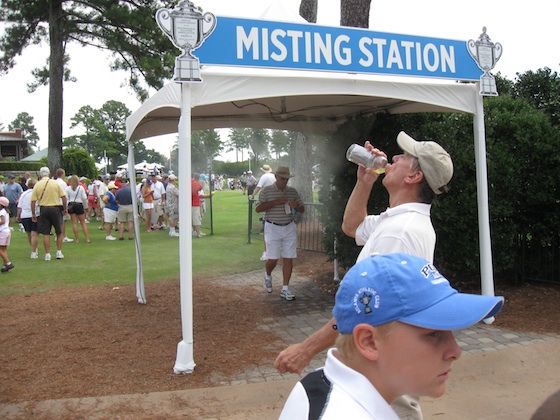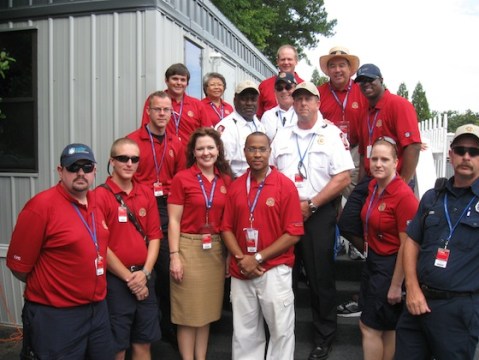
Take heat in the 90s and the typical August humidity. Mix in thousands of people of all shapes, ages, fitness and health levels, and add a touch of alcohol and caffeine.
Conditions at this week’s PGA Championship are ripe for heat-related illness. The medical crew at the golf tournament, though, is ready for plenty of action.
The tournament’s medical staff, including local physicians and nurses, is operating three First Aid medical stations at the Atlanta Athletic Club in Johns Creek, the site of the tournament. And several mobile emergency teams roam the course.
The medical toll for Monday — a day with a triple-digit heat index — included a sprained ankle, some insect stings and several heat-related illnesses.
“A lot of pre-existing illnesses are exacerbated by the heat,’’ said Christine Hill of Rural/Metro EMS, which is part of the tournament medical services team.
“Hydration” is the buzzword among the medical and emergency staff.
“We’re allowing people to bring in their own water,’’ said David Donatucci, director of fitness and performance for the PGA of America.
Once on the course, spectators can refill their water bottles at one of the water machines and fountains. They also can stroll through one of the water-misting stations. And grandstands around the 7th, 9th and 18th greens have large fans that blow a cool mist over spectators.
Hazards under the sun
Still, it’s August in Atlanta.
A CDC epidemiologist, in a separate interview, said anyone facing this level of heat and humidity at an outdoor event needs to take precautions. “People should take it seriously,’’ said Rebecca Noe, a heat expert with the federal agency. “Heat is dangerous.’’
If people feel dizzy, she said, ‘’and it doesn’t go away, and if you’re feeling worse, you should reach out for some medical attention.’’
Jeff Hogan, chief of the Johns Creek Fire Department, and part of the tournament medical response team, said he anticipates up to 1,000 medical visits over the week, with a possible cardiac arrest at the most serious end of the spectrum.
Nearby Emory Johns Creek Hospital, which is overseeing the medical care at the First Aid stations, also has ramped up staffing in its emergency room, said Kendra Gerlach, a hospital spokeswoman.
Dr. Tony Landis, a Gwinnett County oncologist who’s part of the medical team, said maps show spectators the location of the first aid stations, which are staffed by a physician and a nurse.
“There’s a high level of medical care being provided out here,’’ Gerlach said.
Doing what they need to do

The medical team is bracing for the big crowds that will come when the tournament starts Thursday, and especially on the weekend, which could attract 40,000 fans a day.
Some spectators during the practice round Tuesday said that they were taking care to ward off any heat trouble.
The heat ‘’is not an issue as long as you can find shade and a water fountain close by,’’ said David Jones of Johns Creek.
Two native Europeans walking the course, Peter Hicks and Chris Lee, said Tuesday’s conditions appeared better than the day before. Their verdict on Monday’s heat? “Unbearable,’’ said Hicks. “Terrible,’’ said Lee.
A couple from England, Keith and Pat Dean, said while resting in some shade that they have become acclimated to the Southern heat, having moved to this region three years ago.
They said they were drinking ‘’plenty of fluids’’ and using ‘’plenty of sunscreen.’’
“You have to adapt,’’ Keith Dean said.
SOME TIPS FOR BEATING THE HEAT AT OUTDOOR EVENTS:
- Drink plenty of water.
- Wear loose-fitting, lightweight, light-colored clothing.
- Use sunscreen, and then reapply it.
- Wear comfortable shoes.
- Be well-rested.
- Watch your intake of alcohol and caffeine. If you’re going to drink alcohol, stay hydrated.
- Wear a wide-brimmed hat.
- Take a break in air conditioning, when possible.
Source: CDC, tournament medical personnel.
Here is a link to CDC tips for handling the heat.
